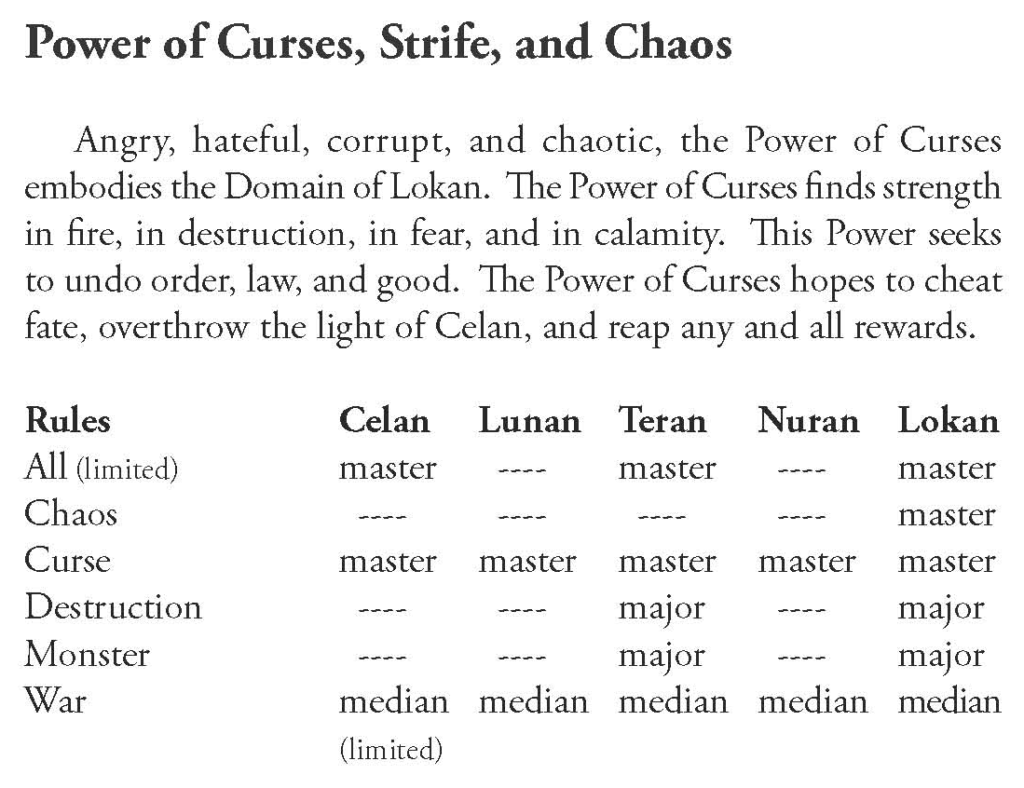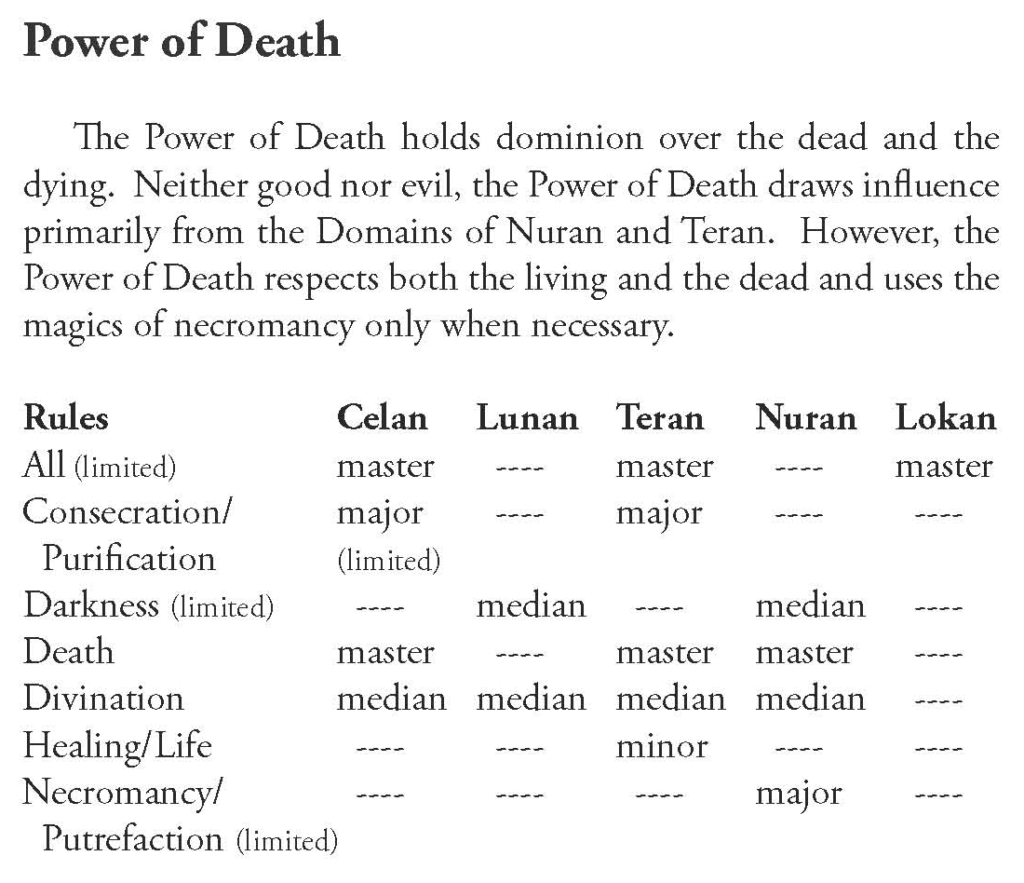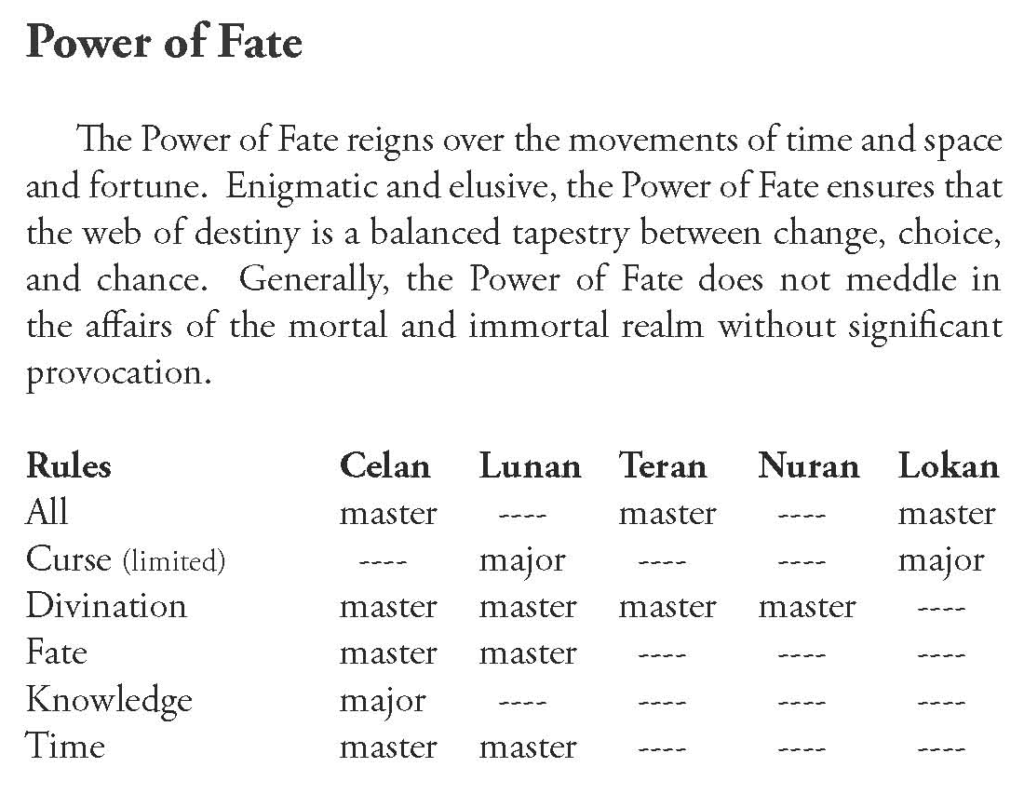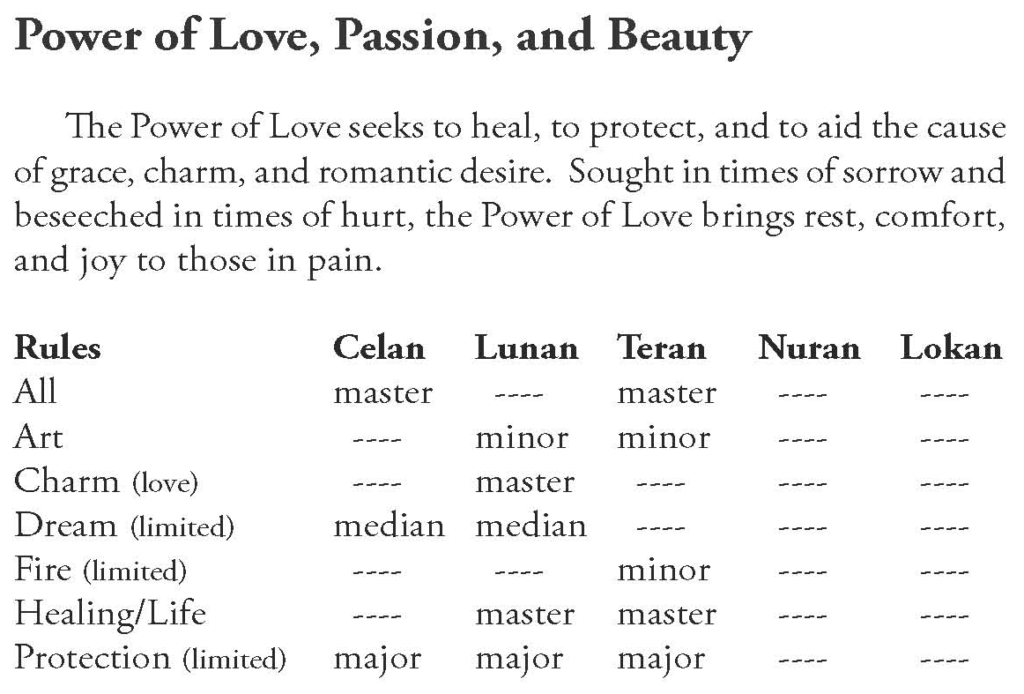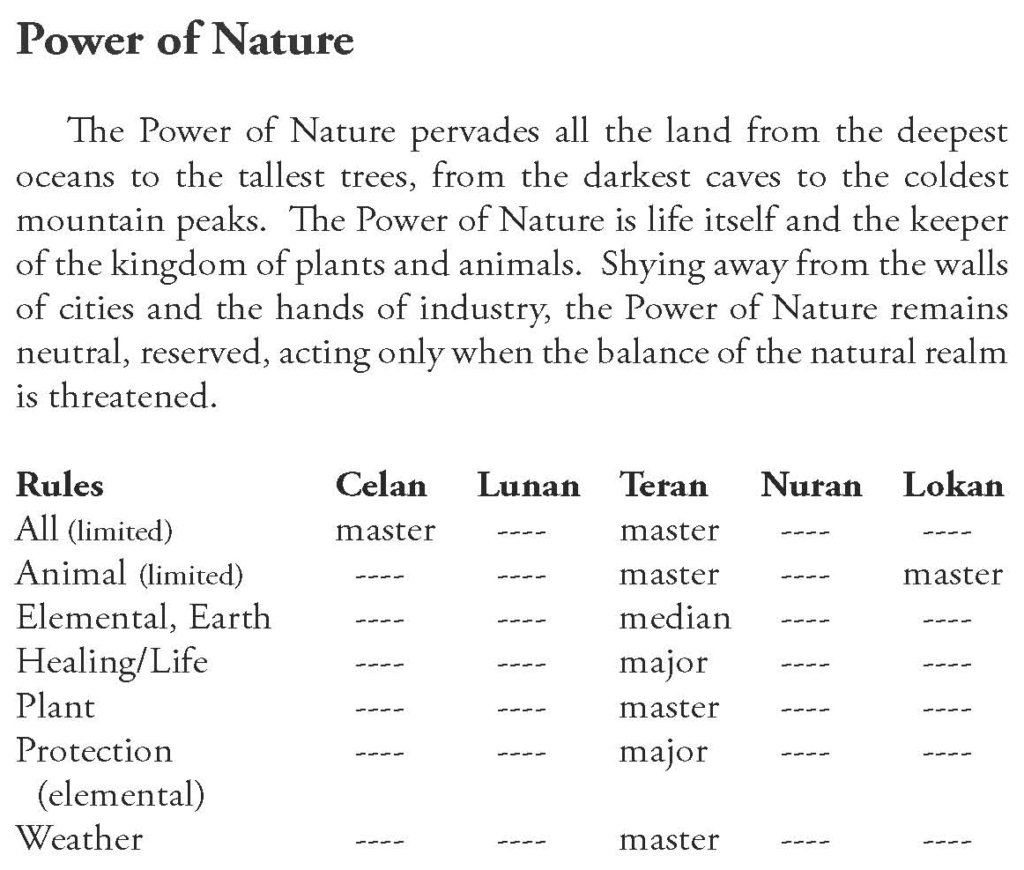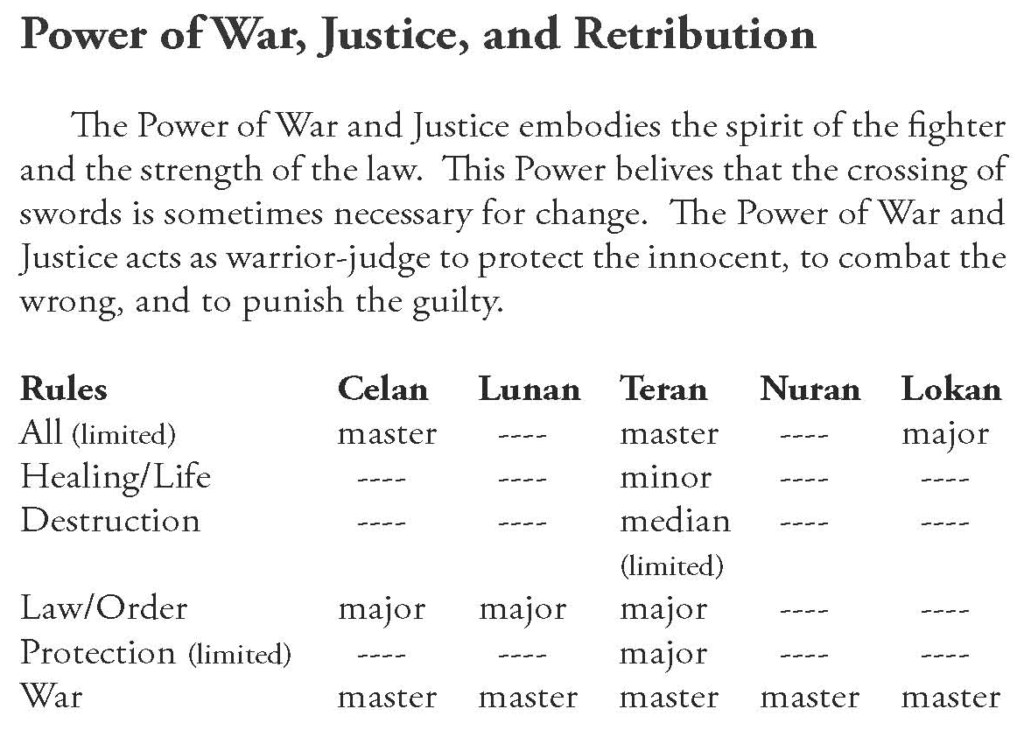
Like magic, the invocation of the divine and the role of prayer users is central to the fantasy and worldbuilding of Tellings allowing for a range of characters that draw strength, favor, and power from a god (or mythic source) be they priests, clerics, healers, druids, paladins, or holy or unholy champions. While priests are bestowed great potential and powers, they are also bound by their god or goddess’s tenets and strictures. While the priest remains in good standing with their god, they may continue to serve and pray and work divine magic. However, if they turn away or fail their god, their powers may be stripped, and they may face further sanction or punishment. Divine magic is organized into five domains or spheres of power–Celan, Lunan, Teran, Nuran, and Lokan–and forty-one rules or specific influences including animal, chaos, charm, consecration, creation, curse, darkness, death, divination, healing/life, light, luck, magic, plant, protection, time, travel, and war with over 400 separate prayers. The rules and mechanics for priests and praying is different than the ways mages access spells and magic giving players a unique role-playing experience.
The Oath and the Deed
The oath is the covenant between the priest and his or her deity, between a devotee and their higher power.
The oath is the words spoken in moments of silence, said at grace before meals, whispered in hushes at temple, and proclaimed in glory of battle. By calling upon the name of a god, goddess, or higher power, by speaking verses of praise and platitude, by showing a heart of faith, piety, and devotion, the priest invokes the magic of the divine.
The realms of earth and sky, of day and night, of order and chaos are the demesnes of the divine. The houses of the sun and moon, of the star and serpent, of the wind and the deep are the seats of the divine. The powers of body and spirit, energy and element, fate and fortune are the rule of the divine. Gods and goddess are creation and destruction, wisdom and whim, life and death incarnate. The shape and source of all things comes from the divine and the reserved privilege, the greatest gift, of healing and vitality itself is the sole right and reign of the higher powers.
Where mana is sentience, that sentience is divine. Where the mage must struggle to control magic, the priest must have trust to embrace it. Where the power of magic must reap mana, the power of prayer is mana given. Where the spell is the grip of artifice, the prayer is the kiss of inspiration. Where the voice and the form is silent, the oath and the deed speaks true.
And by speaking the prayers dedicated to the divine, the priest invokes and evokes the favor of his or her deity. Word becomes way. Phrase becomes force. The priest calls upon the divine portion afforded to them. Eloquence becomes energy. Belief becomes boon. The oath grants purpose to potential. The oath, tempered with true piety, ensures the deed.
The deed is the complement to faith. The deed is miracle realized. However, the deed is not the jinn’s wish—a blind gift. It has reason and consideration. It has place and purpose. To receive, the priest must do more than simply ask. The priest must honor, understand, and obey. The oath is the word; the deed is the work. The oath is the priest’s promise; the deed is the god’s provision.
The Wright may expand the definition of the oath and the deed in ways above and beyond the relationship between deities and priests, between gods and believers. The scope and scale of the oath and the deed can include ancient beings or spirits, demons or dragons, even some primordial entity that bestows power and energy to would be supplicants, cultists, minions, and followers. The Wright must determine how the oath and the deed works in the game world.
Blessed, Divine Magic,
and Vows of Power
To invoke the oath and the deed, a character must first have the Strength Blessed, which earns the character favor in the eyes of a deity or power as well as the privilege of taking on the Strength Divine Magic. Divine Magic can only be bought through the Weakness Vows of Power, the tenets set forth by the character’s deity in exchange for blessing and miraculous abilities. Only characters with Divine Magic can call upon the oath and the deed to heal, cure, and resurrect the dead. See Chapter Four for details on the Strengths Blessed and Divine Magic and the Weakness Vows of Power. See the later sections of this chapter for details on prayers and praying.
Remember that the power of the priest is often wide and far-reaching. The oath and the deed grant the character exacting purpose, direction, and security. However, such power can be easily and personally manipulated and abused. The priest seemingly has the broadest reign yet must be constantly reminded of even their smallest restrictions. The Wright must be clear and fair about Vows of Power. The Wright must carefully adjudicate and approve of the gifts and guidelines granted by the divine.
The Domains
The Domains are the cosmic existences, the planes of power, the universal dimensions, the sources of mana, and the realms of gods. The Domains can be seen as existing simultaneously or layered like the strata of rock or radiating out from some central nexus of power. The Wright must determine the shape or nature of the cosmos and how the Domains fit into the cosmology of the game world.
The Domains are the wellsprings of power for the priest. Each Domain is a given magic, energy, strength, influence, and philosophy. Depending on the nature of a deity or power, access to the magics of the Domains will vary.
Most deities or powers dominate one Domain—the existence of their primary mythos or essence—and have some, little, or no access to the other Domains. For each Domain, the Wright must determine the maximum level of prayers that a god or goddess can bestow upon their priests. Adjunct to the Domains are the Rules that further serve to delineate and specialize each deity’s influence. The Domains number five: Celan, Lunan, Teran, Nuran, and Lokan.
Celan
The powers of Celan embody good, divine love, positive energy, light, order, law, knowledge, inspiration, and the wisdom of augury and divination. Celan is the Domain of the sun, the stars themselves, and all that is solar, celestial, and astrological. Celan is also the Domain of time and eternity. The power of purification and consecration reside in the Domain of Celan.
Lunan
The powers of Lunan lie primarily in the magics of charms, enchantment, psychic influence, illusion, emotion, and the magic of the astral, the ethereal. Lunan is the Domain of the moon, the dawn and the dusk, the starry night, and the spirit folk. Lunan is also the Domain of dreams and memory.
Teran
The powers of Teran are the powers of the physical, the material, the elemental, the corporeal, the animal, and the natural. Teran is the Domain of life, of humanity, and the Domain of the world people eat, sleep, build, and walk upon. The powers over air, earth, fire, water, wood, beast, and body reside in Teran. Therefore, the power to heal and cure is also the purview of the Domain of Teran. Lastly, since life and mana are interconnected, the raw power of magic itself lies in Teran.
Nuran
The power of Nuran lies primarily in the magics of darkness and obfuscation, in necromancy, and the magic of death and the undead. Nuran is the Domain of the underworld, of the grave, of the dying, and of the dead. Nuran is darkness born out of corrupted light, of absent light, of negated light—unlike the starlit darkness of Lunan. Lastly, Nuran also embodies the forces of corruption, unnatural decay, disease, and putrefaction.
Lokan
The powers of Lokan embody hate, evil, negative energy, chaos, confusion, insanity, and the creation of monsters and demons. Lokan is the Domain of lawlessness, of strife and destruction, of the void, of the abyss, of total entropy. The forces of Lokan strive to lure, seduce, corrupt, disrupt, and eventually annihilate. The power of curses and desecration reside in the Domain of Lokan.
Rule
Each prayer falls under a particular Rule or sphere of influence. Like spell schools, the rules are arbitrary categories or areas of magic. For ease of dividing and delegating different powers to different deities, prayers are more easily organized by categories of thought, philosophy, purpose, energy, or material. Furthermore, a prayer may be described by its effects as well as its goal or intent.
Rules include: animal, art, chaos, charm, consecration, creation, curse, darkness, day/sun, death, desecration, destruction, divination, dream, elemental (air, earth, fire, water), fate, healing/life, illusion, knowledge, law/order, light, luck, magic, monster, necromancy, night/moon, perception, plant, protection, purification, putrefaction, science, time, trade, travel, war, and weather. In addition, some prayers are common to all priests and powers and are listed under the rule of all. The Wright may add or subtract Rules to fit the game world.
Depending on the nature of the priest’s deity or power, the kind of prayers and the kinds of effects a priest can use will vary. The Wright must determine the level of power that a god or goddess grants for their respective Rules.
The player and Wright may use the Rules to organize prayer effects, create specialized priests, and form specific powers for specific deities. The Wright must keep in mind the concept and description of each god or goddess. The Wright must tailor each list of prayers under each Rule to each deity. Some deities may have greater or limited access to particular prayers. Just because a prayer falls under a particular Rule does not mean it belongs in the mythos of a specific higher power.
On the other hand, certain prayers may make sense for a deity though they may fall outside their given Rule. With the help of the players, the Wright must decide what prayers are appropriate for each divine power and mythos.
Prayers
Prayers create a conduit to the priest’s power. A combination of voice and faith, vision and trust, the prayer sounds across the Domains and whispers in a deity’s ears. The oath beseeches and, if it pleases the divine, the deed is realized.
Like a mage’s spell, a prayer is described in similar terms. A prayer has ten fields: verse, name, level, Domain, Rule, range, area of effect, duration, components, and description. Each field details the mechanics of the prayer. Most of the basic mechanics are exactly the same as mage spells; therefore, see Chapter Five for additional details on range, area of effect, duration, components, and description.
However, unlike a magical formula, a prayer has a fixed form, a fixed cost, and a fixed power. Prayers cannot be stacked or manipulated like spells but the powers they call are no less effective, sometimes they are more effective, than mage magic.
Sample Prayers
Below are a few excerpt pages from Chapter Six of Tellings:
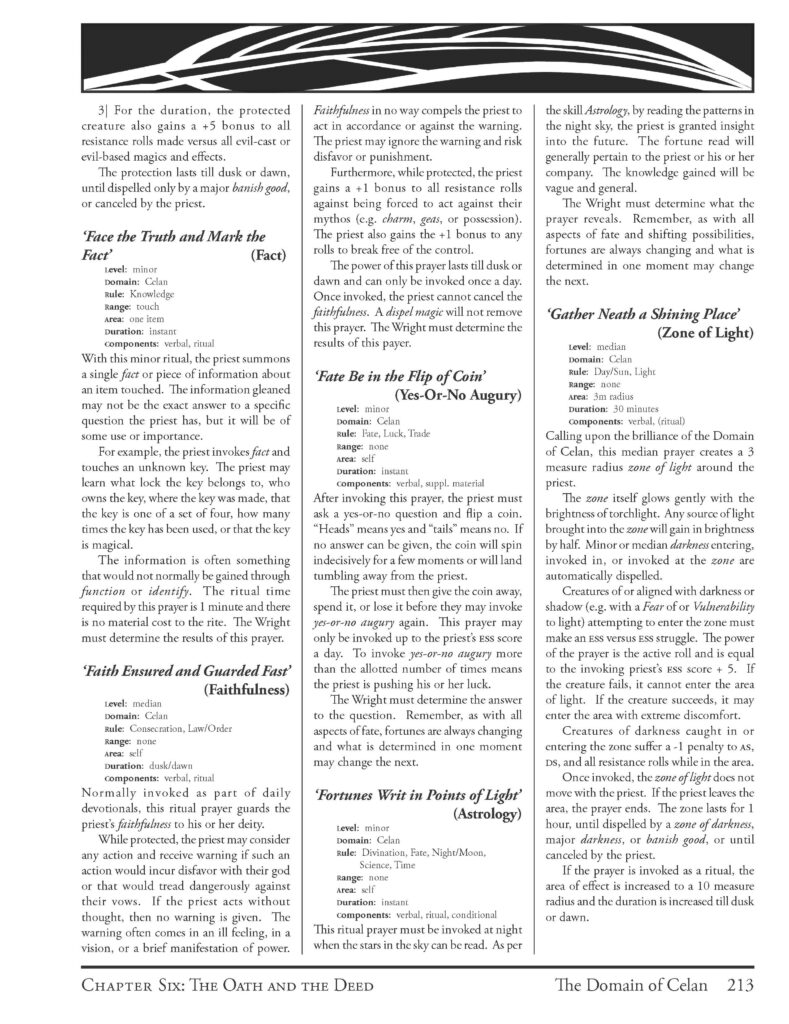
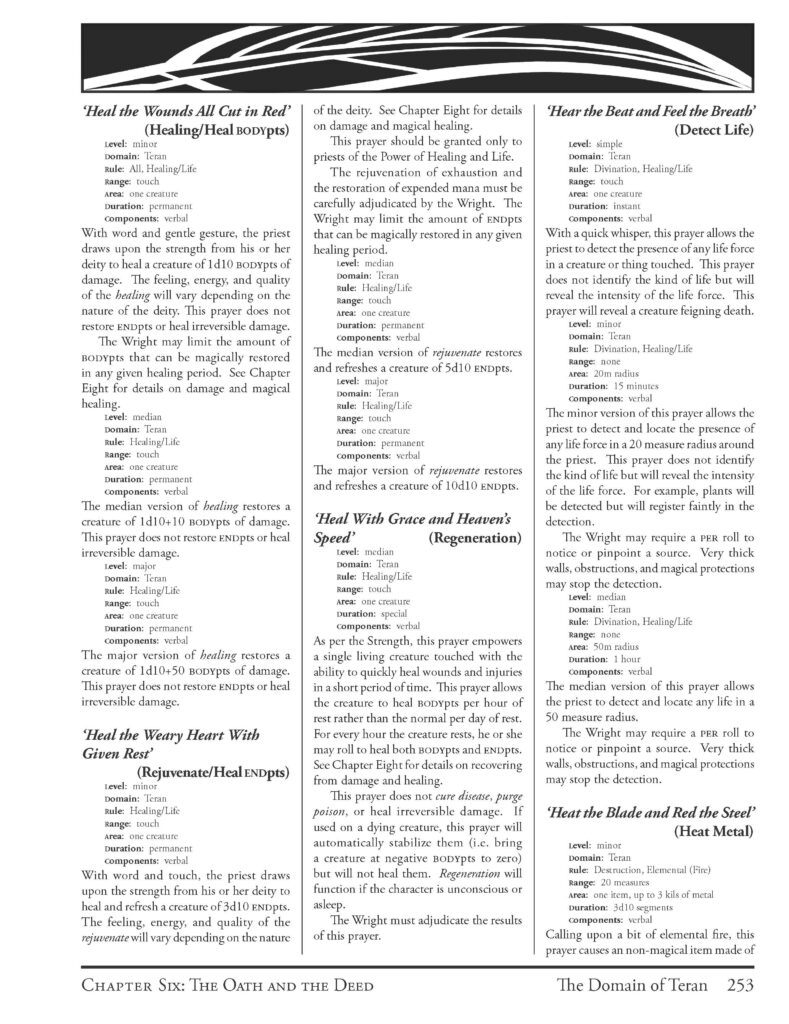
Examples of Powers
The following is a list of example powers or deities and their defined Rules for prayers. The Wright should expand or combine the list of powers to suit the campaign world and the list of divine powers. Depending on the nature of the game world and the nature of the deity, the spheres of influence for each power will vary. The examples are listed with the Domains and Rules available to each god or goddess. The Wright should look at each Domain and the list of prayers for each rule to determine the range of power for each god or goddess.
As a general guideline, the Wright must determine the goals, abilities, and mythology for the game world’s gods and goddesses. In a pantheistic cosmology, specific powers often have specific purviews over different aspects of the spiritual, emotional, magical, and physical world. The game world could have a god or goddess for each particular Rule, or the game world could have a much smaller pantheon where each god or goddess reigned over multiple but related Rules.
The Wright must consider the Domains in which the deity’s power resides. Deities generally claim only one Domain as their house or demesne but have powers that extend across other Domains. More importantly, the Wright must decide the power’s oppositional Domains (if any) and limit access to only the realms available to the god or goddess. Each power should have major or master level access to one or two Rules—these are the deity’s primary spheres. Then, each power should have median or minor access to a handful of related Rules—these are the deity’s secondary spheres.
Remember that access to a Rule does not mean access across all Domains or to all prayers within that Rule. Certain Domains and Rules may be “limited” for a particular deity meaning they cannot gain or use every prayer, effect, or power.
